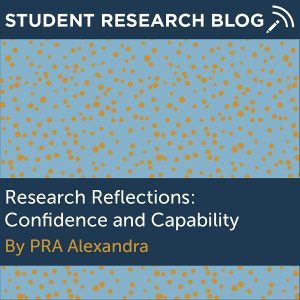 By Alexandra Bettencourt, Peer Research Ambassador
By Alexandra Bettencourt, Peer Research Ambassador
Think about a time when you have said to yourself “what else could possibly go wrong?” We’ve all had those moments. The moments that feel like we can’t figure a way out of whatever challenge is holding us back. When I started my journey in undergraduate research, I never imagined that the greatest thing that it would teach me would not be a clinical laboratory skill or how to present in front of hundreds of people. The greatest thing undergraduate research could have ever taught me was to have confidence in my own capabilities, and that I have the power to solve the moments where it feels like nothing else could go wrong. And that is just what it did.
Let’s go back to that “what else could possibly go wrong?” moment. Over the course of my time as an undergraduate researcher, I have had too many of these moments to count. After extensively researching laboratories to conduct necessary assays for part of my thesis project, all of the laboratories I had identified informed me that they did not have the appropriate reagents and equipment to assess my species-specific samples. I felt disappointment. Working with live animal models means that despite the gold-standard care and all preventative measures, some animals still get sick as a natural part of life. In these instances, I felt disheartened. A worldwide pandemic forced me, and so many others, to leave work behind, and left me unable to help members of my laboratory care for our research animals. I felt powerless. But here’s the thing: it isn’t these frustrating, unexpected experiences that shape us. It is how we respond to these experiences that determine what we will learn from them.
That moment when I thought that no assays existed on the face of the earth that could run my sheep milk samples? I turned to the incredible team of graduate students in my lab, and one of them was able to dig through scientific literature to find a test kit for us to try, despite it not being labeled for my specific type of sample. The funny thing? The first two times we ran the assay using the kit – the results were a flop. Though each time, we learned something that might have gone wrong, and took notes for next time. We will be trying to run the samples one last time. And if it doesn’t work? I’ll leave all that I know for the person who attempts to collect the data next time. Research is learning through failure, and we can still be confident in our abilities, even if it doesn’t always lead to the best result possible. As I head off to veterinary school this fall, I will remember the animals that I met through my research, the care that they received, and how I will implement the quality practices I learned here at UConn into my future profession. Oh, and that powerless feeling that many of us have now felt for the last year? My own interpretation of the feeling evolved – to resilience, compassion, and a sense of community. Our research community learned how to navigate a virtual world, safely work together in-person to care for our animals, and work together to continue data collection for various projects during such a challenging time.
My final message: it’s okay to shed those exasperated tears. We can live in those moments where everything seems to be going wrong and feel every emotion that comes along with them. But then, we lean on our teams, we learn from our experiences, and we do everything possible to overcome the challenges before us. Everything will not always start as planned, but we have the option to do everything in our power to make the outcome golden. After overcoming challenge after challenge during my time in undergraduate research, I have come to realize that developing confidence in our own capabilities is what gives us the power to adapt to the unexpected.
Alexandra is a senior double majoring in Pathobiology and Animal Science. Click here to learn more about Alexandra.